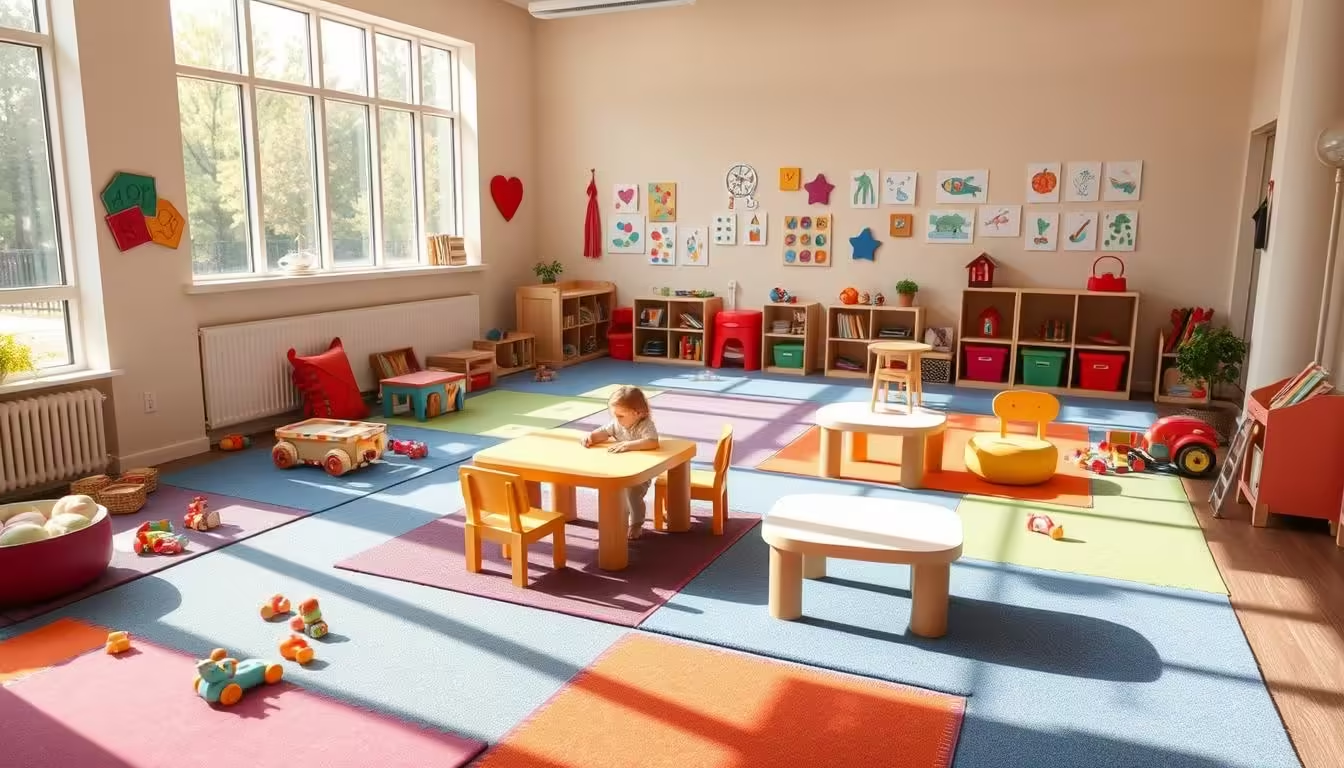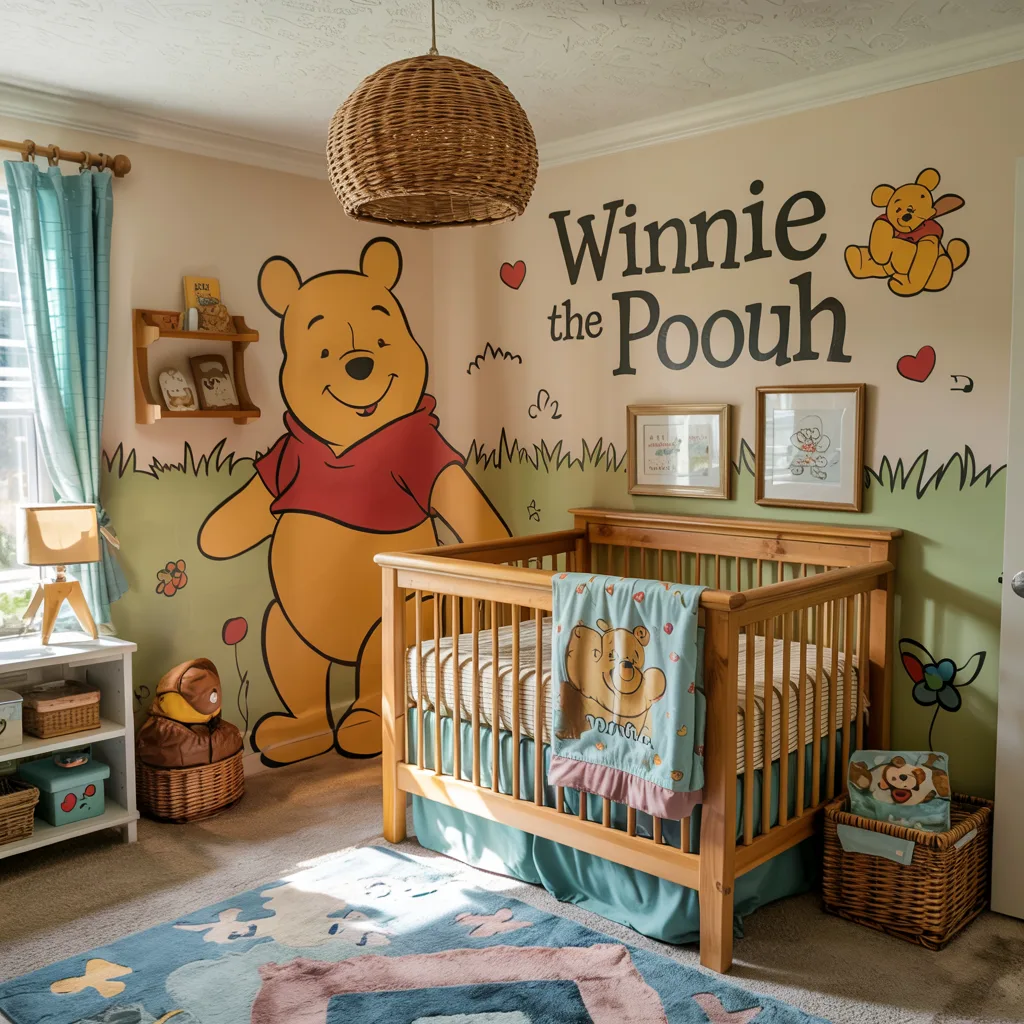Deciding when to start your toddler in daycare is both thrilling and nerve-wracking. In the U.S., daycare centers can take babies as young as 6 weeks. Yet, many parents prefer to wait a bit longer. In fact, 32% of American parents choose center-based daycare for their babies.
Choosing the right time for toddler daycare depends on several things. These include your personal views, budget, and other child care options. Some parents might wait until their child is a bit older. Research shows that starting daycare at 6 weeks can help with secure attachments. But, the best age for preschool age daycare really depends on your child’s growth and your family’s situation.
Key Takeaways
- Many child care centers accept infants as young as 6 weeks old for daycare for young children.
- 32% of American parents who require regular child care use center-based toddler daycare.
- The “ideal age” for when do toddlers start daycare can vary depending on your child’s development and your family’s needs.
- Research suggests that starting daycare for young children as early as 6 weeks can offer benefits, but waiting a bit longer may also be beneficial.
- Factors like parental leave, finances, and alternative child care options can influence the decision of when do toddlers start daycare.
Table of Contents
What is Toddler Daycare?
Toddler daycare is a childcare option for kids aged 12 months to 3 years. It offers supervision, education, and fun activities. There are different types, each with its own benefits and things to think about for parents.
Definition of Toddler Daycare
The first source says toddler daycare can be different. It can be child care centers, in-home daycares, or nannies. Each has its own good points and things to consider.
Types of Daycare for Toddlers
- Child care centers: These places care for groups of kids, divided by age.
- In-home daycares: These are homes where providers care for kids in a cozy setting.
- Nannies: Nannies watch kids at home, giving them personal care.
| Type of Daycare | Benefits | Drawbacks |
|---|---|---|
| Child care centers |
|
|
| In-home daycares |
|
|
| Nannies |
|
|
Parents should think about the pros and cons of each daycare type. This helps find the best fit for their family.
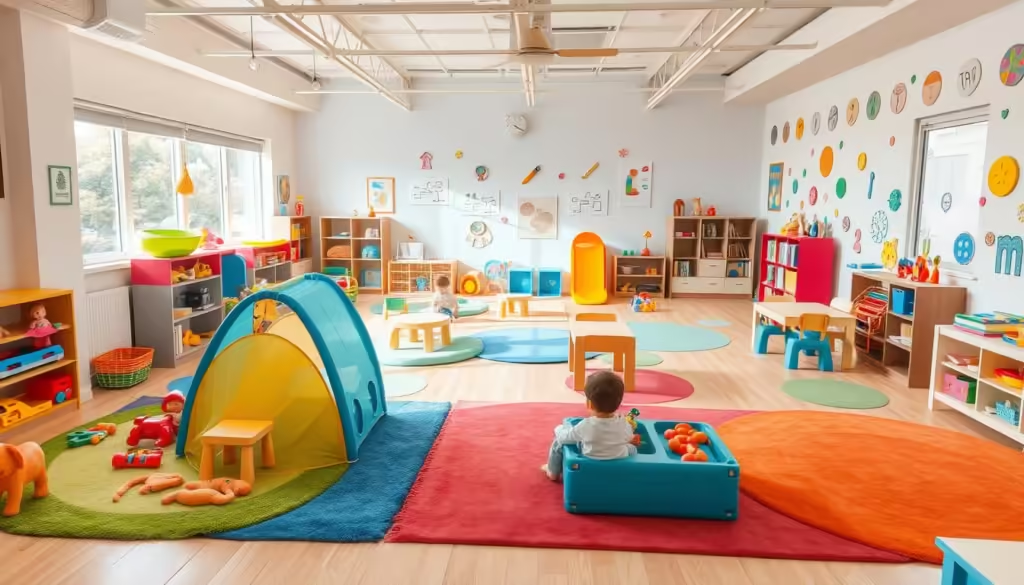
When is the Right Time to Start Toddler Daycare?
Deciding when to start your toddler in daycare is tough for many parents. Some centers take infants at 6 weeks, but experts say wait a bit. This lets your baby bond, heal, and adjust to a new schedule.
But, for working parents, waiting isn’t always possible. Starting daycare early, like 6 weeks, can be good. It offers structured learning and chances to grow.
Finding the right age for toddler daycare varies by family. It depends on your situation, your child’s needs, and what you prefer. The goal is to choose what’s best for your toddler and family.
Start looking and planning for when to start toddler daycare early. Quality child care spots fill up fast. Begin your search and apply early, often in spring or summer for a fall start.
| Typical Enrollment Seasons | Factors to Consider |
|---|---|
|
|
By thinking about these points and planning early, you boost your chances. You’ll find a top-notch daycare for your toddler.
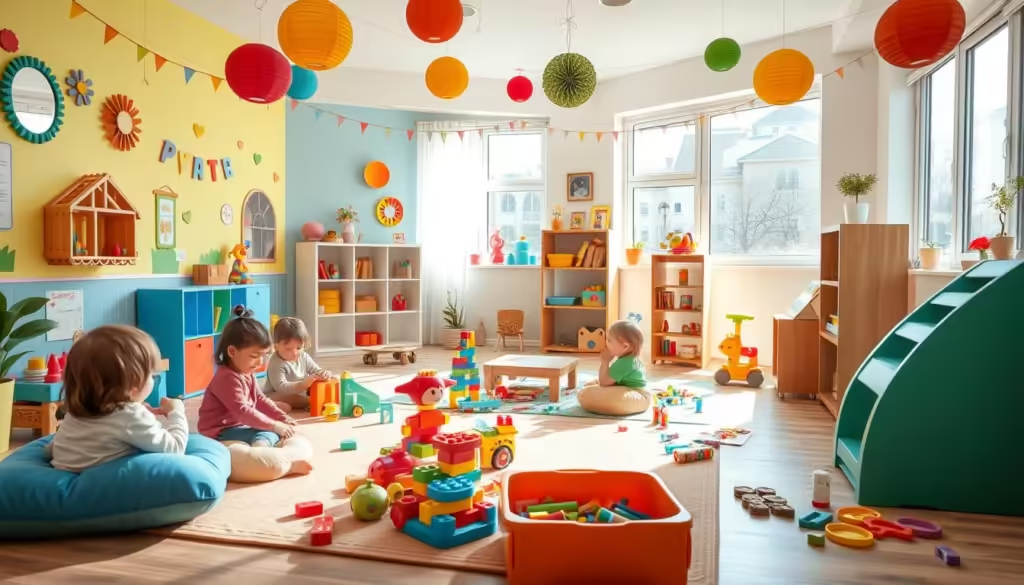
Signs Your Toddler is Ready for Daycare
Wondering when to start your toddler in daycare is normal. Every child grows at their own pace. Yet, some signs show when they’re ready for daycare. Knowing these signs helps make the transition easier and ensures a good daycare experience.
Developmental Milestones for Daycare Readiness
One key sign is when your toddler can clearly tell you what they need. By 18 months, they should use simple words or sentences. This helps them talk to caregivers and friends.
Another sign is better fine motor skills. Toddlers are usually ready for daycare between 18 and 30 months. They can hold crayons or feed themselves with a spoon.
Also, around 18 months, toddlers start to play with others. They play side-by-side but not together. By 2-3 years, they can follow simple directions. This is important for daycare.
Separation Anxiety and How to Cope
Separation anxiety is a big challenge for parents. Toddlers often feel anxious when parents leave between 12 and 18 months. But, this usually gets better between 18 to 24 months as they become more confident.
To help with separation anxiety, the first source suggests that babies thrive in daycare with lots of one-on-one attention from a single caregiver, like in-home daycare. It’s also important to build a strong bond with caregivers, especially for babies under 18 months. The second source recommends practicing short separations before preschool to help a child get used to being away from home.
Understanding your toddler’s growth and helping with separation anxiety makes daycare easier. This way, your child can enjoy the new world of daycare.

Benefits of Starting Daycare for Toddlers
Putting your toddler in daycare can be very beneficial. It helps with their social, emotional, cognitive, and language skills. Studies show that good daycare can make a child ready for school and happy.
Social and Emotional Development
A 2017 study found that toddlers in daycare do better socially and emotionally. They become more confident and friendly, no matter how many days they go. It’s the quality of care that matters, not how often they go.
Cognitive and Language Development
Daycare also boosts toddlers’ thinking and speaking skills. By age five, most of a child’s brain is already formed. Daycare gives them a chance to learn and grow, preparing them for school.
| Age Range | Daycare Benefits | Potential Drawbacks |
|---|---|---|
| 0-12 months | None | Damage to cognitive skills, worse behavior in school |
| 12-24 months | Slight cognitive skill improvement | Larger negative effects on later behavior in school |
| 24-36 months | Beneficial for later cognitive skills | Children more likely to act out and be angry upon reaching school |
| 3+ years | Boost in cognitive and social skills | Few downsides |
The stats show daycare can really help toddlers. But, it’s important to think about when and how long to start. This helps your child grow in the best way.
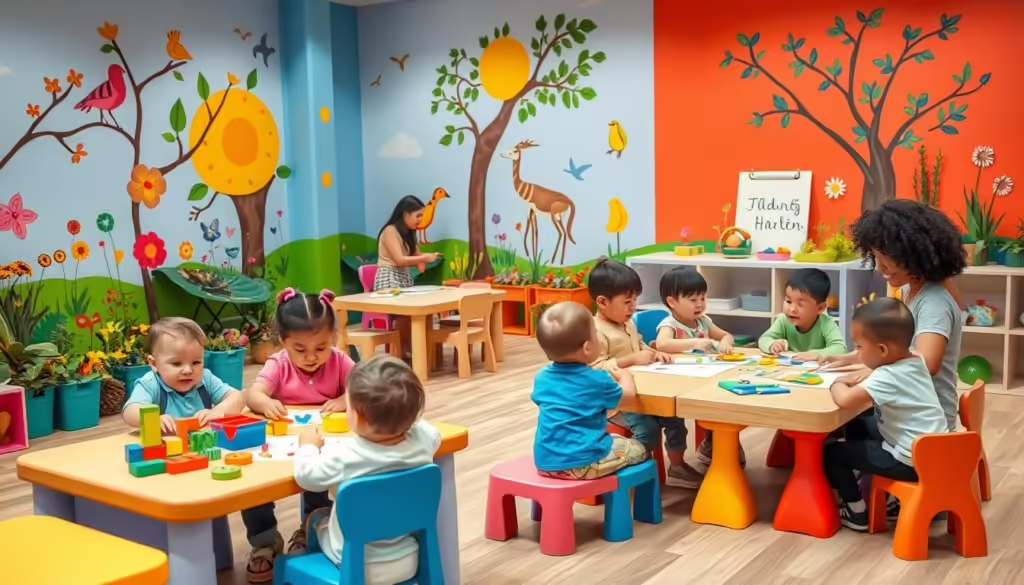
Choosing the Right Daycare for Your Toddler
Choosing the right daycare for your toddler can be tough. But, by looking at key factors, you can find a daycare that fits your child’s needs and your family’s wishes. When choosing a toddler daycare, remember a few important things.
Factors to Consider When Selecting a Daycare
- Staff Qualifications: Find a daycare with staff who are experienced and passionate about early childhood education.
- Caregiver-to-Child Ratio: Make sure the daycare has a good staff-to-child ratio for your toddler to get the attention they need.
- Daily Structure and Curriculum: Check the daycare’s daily schedule and educational approach to see if it meets your child’s needs.
- Licensing and Accreditation: Choose daycares that are licensed and accredited. This shows they follow safety and quality standards.
- Facility and Environment: Look at the daycare’s physical space, cleanliness, and atmosphere. It should be safe, nurturing, and stimulating.
- Communication and Collaboration: Find a daycare that values open communication and works well with parents.
- Cost and Availability: Consider the tuition fees and if there are spots available. These can affect your family’s childcare choices.
By carefully evaluating these factors when selecting the best daycare for your toddler, you can make sure your child gets the quality care and early learning they need.
“The type of care matters less than the quality of care. What’s most important is a healthy, safe, consistent, and emotionally supportive environment.”
Preparing Your Toddler for the First Day of Daycare
Starting daycare can be both thrilling and scary for your toddler. But with the right steps, you can make it easier for them. Here are some tips to help your toddler get ready for their first day:
Creating a Routine and Easing the Transition
Having a regular morning routine can really help your toddler adjust to daycare. Start practicing this routine a few weeks before, including getting dressed, eating breakfast, and leaving the house. This makes them feel more at ease and familiar with the process.
It’s also smart to visit the daycare with your toddler before the first day. This lets them get to know the place, meet the teachers, and understand the layout. It can help reduce their anxiety and make the first day less scary.
- Talk about daycare in a positive way, emphasizing the fun activities and new friends they’ll make
- Practice short separations at home to help your toddler feel more secure when you leave
- Develop a special goodbye routine, such as a hug, high-five, or secret handshake, to provide comfort and reassurance
- Encourage independence in self-care tasks like putting on shoes or washing hands to build their confidence
Remember, every child is unique, and it might take time for your toddler to adjust. Stay positive, be patient, and work closely with the daycare staff for a smooth transition.
when do toddlers start daycare
Deciding when to start toddlers in daycare is a big choice for parents. Some centers take infants as young as 6 weeks. But many parents wait until their toddlers are a bit older.
The average age for toddlers to start daycare is around 12 to 24 months. This age range is often seen as the best time.
Starting daycare at 12 months helps with emotional growth. Toddlers start forming strong bonds with their caregivers. They also learn important social skills like sharing and talking effectively.
Being in daycare early can also help toddlers fight off sicknesses better. This is because they get exposed to different germs.
However, starting daycare too early can be tough. Toddlers might feel anxious about leaving their parents. They might also struggle with forming a secure attachment to their caregivers.
Parents need to think about the pros and cons before deciding. The right time for daycare depends on the child’s emotional and social readiness. It also depends on other childcare options and the parents’ work and personal lives.
By considering these factors, parents can make a smooth transition. This ensures a positive daycare experience for their child.
“Starting daycare between the ages of 2 and 3 can enhance social skills, emotional development, and early learning experiences.”
Preparing for the first day of daycare is crucial. It’s important to create a supportive environment for the child. This can include talking positively about daycare, reading picture books, and visiting the center before the start date.
The age when toddlers typically start daycare can vary. But finding the right balance between the child’s needs and the family’s situation is key. By focusing on the child’s well-being and making a smooth transition, parents can ensure a successful daycare experience.
Transitioning from Home to Daycare
Switching your toddler from home to daycare can be tough for both of you. But, with the right steps, it can be a smooth and positive change. Here are some tips to help your toddler adjust to daycare:
- Talk about preschool ahead of time. Start talking about the change with your toddler. Share the fun new experiences and friends they’ll make.
- Visit the daycare together. Go to the daycare center before the first day. Let your child explore and meet the caregivers.
- Establish a consistent morning routine. Make a routine for mornings. This will help your child feel secure and know what to expect.
- Practice short separations. Start with short times away, like a babysitter for a few hours. This helps your child get used to being away from you.
On the first day, stay positive and calm. Your child will notice your mood. Let them bring a favorite toy or blanket for comfort. After the first day, celebrate their small wins and be patient as they adjust.
| Statistic | Value |
|---|---|
| Percentage of children aged 3 or younger in childcare | 53% |
| Average age to start daycare | 12 months |
| Percentage of children in center-based daycare | 73% |
| Average annual cost of daycare | $9,000 – $9,600 |
By following these steps and staying positive, you can help your toddler smoothly transition to daycare. This will prepare them for a fulfilling and enriching educational experience.
Dealing with Separation Anxiety
Starting daycare can be both exciting and sad for toddlers and their parents. Toddlers may feel scared or upset when they’re away from their loved ones. This feeling is common and can start as early as 6 months old.
Toddlers might cling to their caregivers, throw tantrums, or resist leaving. They might also feel scared or restless when they’re apart. These feelings usually go away when their caregiver is back, but they can last a long time.
To help cope with separation anxiety for toddlers starting daycare, have a consistent drop-off routine. Create a special goodbye ritual that your toddler looks forward to. Giving your child lots of love and attention during this time can help a lot. Remember, your child will feel your emotions, so stay calm and positive.
If your toddler’s anxiety is really affecting their daycare experience, get help from a child psychologist. They can offer strategies to help your child adjust. With the right support, you can handle toddler separation anxiety for daycare and help your child feel better.
Fostering Independence in Toddlers
When your toddler starts daycare, it’s key to help them grow independent. Studies show kids who learn to do things on their own feel more confident and capable. This independence helps them solve problems better and think critically.
Setting up a tidy play area is a great way to encourage independence. It makes it easier for kids to find and put away their toys. In daycare, giving kids choices and letting them explore helps them grow independent.
Montessori schools focus on letting kids learn at their own pace. This approach helps kids become more independent. Giving kids simple chores teaches them about responsibility and teamwork.
Good preschools offer choices and encourage kids to take the lead. This helps kids learn to make decisions and solve problems on their own. It’s important to praise their efforts, not just their results, to boost their confidence.
Parents often find it hard to know when to help and when to let go. It’s important to let kids try things on their own to build their confidence. Gradually giving them more independence helps them become more self-sufficient.
Challenging kids in a way that’s just right for them helps them learn to handle frustration. Activities like puzzles and crafts help kids focus and build self-esteem.
Letting kids play on their own is crucial for their creativity and problem-solving skills. Positive feedback and encouragement can help them feel good about themselves.
Quality childcare is essential for helping kids become independent. A structured and supportive environment helps kids feel secure and learn to do things on their own.
Recognizing and celebrating kids’ small achievements boosts their confidence. Giving them simple tasks, like picking up toys, helps them feel capable and proud of themselves.
By giving toddlers chances to learn how to encourage independence in toddlers for daycare and developing self-care skills for toddlers starting daycare, we help them grow into confident and self-reliant individuals.
“Fostering independence in children is crucial for their growth and development. It helps them become confident, capable, and self-reliant individuals.”
The Role of Parents in Toddler Daycare
When your toddler starts daycare, your role is key in their growth. How parents can support toddlers in daycare and parent involvement in toddler daycare are vital. They help make sure your child and you have a great experience.
Being positive and calm is crucial. Your toddler will feel your emotions. So, show confidence and reassurance. Celebrate small wins and be patient as they get used to the new place.
- Follow up with your toddler after the first day of daycare to discuss their experience and address any concerns they may have.
- Collaborate with the daycare staff to understand your child’s progress and any areas where they may need additional support.
- Encourage your toddler to share their experiences and feelings about daycare, fostering open communication and understanding.
Daycare centers often have resources for parents. They might have events, workshops, or help finding local services. Use these chances to support your toddler’s development and work well with the daycare.
| Percentage of Toddlers Starting Daycare at 6 Months Old | Percentage of Toddlers Starting Daycare Between 6-12 Months Old | Percentage of Toddlers Starting Daycare After 1 Year Old |
|---|---|---|
| 30% | 50% | 20% |
Being involved in your toddler’s daycare helps them adjust smoothly. It also helps their social, emotional, and cognitive development. Your support benefits your child and strengthens your partnership with the daycare team.
“The daycare staff have been amazing in helping my toddler adjust to the new environment. Their patience and dedication have made all the difference.”
Cost Considerations for Toddler Daycare
When looking at the average cost of toddler daycare, parents face many factors. Child care centers are often cheaper than nannies. But, prices change based on where you live, the type of care, and your child’s age.
The average monthly cost for center-based toddler child care in the U.S. is $1,096. Infant care costs about $1,324 a month. But, in places like Washington D.C., Massachusetts, and New York, costs can go up to $1,500 or more.
In states like Mississippi, Alabama, and South Carolina, toddler daycare costs can be as low as $800 per month. Some in-home providers offer part-time care, which can be more affordable for families.
Quality childcare centers have a low staff-to-infant ratio. This ensures babies get enough attention. But, it also means higher costs for the center.
Families might get help with the average cost of toddler daycare through tax credits. There are also special programs for Native Hawaiian, Native Alaskan, and American Indian families.
There are many factors that affect daycare costs for toddlers. Parents should look around and compare to find the best option for their budget and needs.
“Childcare expenses can surpass housing, food, or college tuition expenses for many families in the United States.”
Daycare vs. Nanny: Pros and Cons
Choosing childcare for your toddler is a big decision. You might consider daycare or a nanny. Each option has its own benefits and drawbacks. The best choice depends on your family’s needs and what you prefer.
Daycare for Toddlers
Pros:
- Consistent care with backup caregivers
- Chance to make friends and develop social skills
- Structured environment with skilled staff
- Generally cheaper than a nanny
- Helps build a strong immune system
Cons:
- More chance of getting sick from other kids
- Less personal attention than a nanny
- Can feel more like a school than home
Nanny for Toddlers
Pros:
- Personal care tailored to your child’s needs
- Flexible hours and off-hours care
- Help with household chores too
- Intimate setting compared to daycare
Cons:
- More expensive than daycare
- No backup caregivers when the nanny is out
- Less chance to make friends
- Can be less reliable
The choice between daycare and a nanny depends on your family’s budget and schedule. Think about what’s best for your child and your family’s lifestyle. It’s important to weigh the pros and cons carefully.
| Metric | Daycare | Nanny |
|---|---|---|
| Average Weekly Cost | $321 (Daycare Center) $230 (Family Care Center) | $766 |
| Social Interaction | More chances to make friends and learn social skills | More personal attention but less group interaction |
| Caregiver to Child Ratio | Higher than nanny care | One-on-one care |
| Backup Caregivers | Available for emergencies or teacher absences | No built-in backup |
Choosing between daycare and a nanny is not easy. Think about what’s best for your family. This way, you can make a choice that will give your toddler the best care.
Fostering a Positive Daycare Experience
It’s very important to make sure your toddler has a good time at daycare. Building strong bonds with the daycare staff is key. This helps create a caring place where your child can grow and do well.
Building Relationships with Daycare Staff
Get to know the people who will take care of your toddler. Say hello, ask about their teaching style, and tell them about your child’s special needs. This way, the staff can really understand and meet your child’s needs.
Also, help your child talk to the daycare staff. Encourage them to share their thoughts and feelings. This makes your child feel more at ease and builds a strong connection with the teachers.
Don’t just drop off your child and go. Be involved in their daycare life. Go to parent-teacher meetings, help out at events, and keep up with your child’s progress. Showing you care shows the staff you value your child’s happiness and growth.
“Positive relationships between children and their caregivers are the foundation for healthy social-emotional development.” – National Association for the Education of Young Children
By focusing on the bond between your toddler and the daycare staff, you help create a caring space. This is where your child can have a great daycare experience.
Conclusion
Deciding when to start a toddler in daycare depends on many things. These include your family’s needs, your child’s readiness, and the quality of care nearby. Many centers take infants from 6 weeks, but some parents wait longer. This allows the child to adjust and form strong bonds.
The quality of daycare and the relationships with caregivers are crucial. They help your toddler grow and learn during a key time. Preparing your child and yourself for daycare can make the transition smooth. This sets a good foundation for your toddler’s future growth and learning.
Key points about starting toddlers in daycare include the average maternity leave and the best time to start childcare. There are various daycare options, and it’s important to consider separation anxiety. Establishing routines and strong bonds with caregivers is also vital. By making an informed decision, you can support your toddler’s development every step of the way.
FAQ
When do toddlers typically start daycare?
Many child care centers start accepting infants at 6 weeks old. But, parents often wait a bit longer. This allows the baby to bond and adjust to a new routine.
The best time to start daycare is early, like 6 weeks old. This helps with structured learning and early programs. But, the decision depends on many factors like parental leave and finances.
What are the signs that a toddler is ready for daycare?
Babies do well in daycare with one-on-one care from a single caregiver. This is especially true for babies 18 months and younger. Continuity of care is key at this stage.
Practicing short separations before preschool helps a child get used to being away from home.
What are the benefits of starting toddlers in daycare?
A 2017 study found that young children in daycare showed better social skills a year later. This was true even if they only went a few days a week.
Daycare also boosts cognitive and language skills. By age five, 90% of a child’s brain is developed. This makes early years crucial for learning.
What factors should parents consider when choosing a toddler daycare?
Look for staff qualifications and the ratio of infants to caregivers. Also, consider the daily structure, hours, and licensing. The cost and availability of space are important too.
Quality matters more than the type of care. A healthy, safe, and supportive environment is key for development.
How can parents prepare their toddler for the first day of daycare?
Talk about daycare in advance and visit the school together. Establish a morning routine and encourage independence. Short separations and a special goodbye ritual help ease the transition.
What are the cost considerations for toddler daycare?
Child care centers are often more affordable than nannies. Some in-home providers offer part-time care, which can be cheaper. But, costs vary by location, type of care, and age.
It’s important to research and compare options in your area.
What are the key differences between daycare and nanny care for toddlers?
Child care centers offer structure and social opportunities. They are open even if a teacher is sick. But, they may have more illness risks.
In-home daycare feels more home-like but may lack structure. Hiring a nanny provides individual attention but is usually the most expensive option.
How can parents foster a positive daycare experience for their toddler?
Continuity of care and attachments with caregivers are crucial. A quality caregiver is sensitive to a baby’s needs and understands child development. Building relationships with daycare staff supports your child’s transition and experience.

